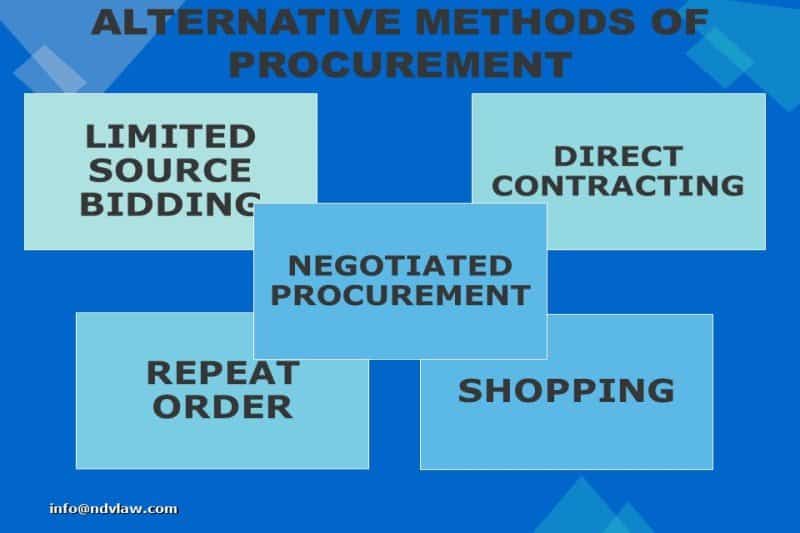This article talks about the exceptions to public bidding in government procurement. This pertains to alternative methods of government procurement such as limited source bidding, direct contracting, repeat order, shopping and negotiated procurement.
The general rule is that government procurement of goods and services must be done through competitive public bidding. It must be pointed out that public biddings are held for the best protection of the public and to give the public the best possible advantages by means of open competition between the bidders, and to change them without complying with the bidding requirement would be against public policy [Capalla vs. Comelec, G.R. No. 201112, 23 October 2012]. In fact, Section 10 of Republic Act No. 9184, otherwise known as the Government Procurement Reform Act, mandates that all procurement shall be done through competitive bidding, except as provided for in Article XVI of this Act.
Alternative Methods of Procurement
Alternative methods of procurement, however, are allowed under R.A. No. 9184, which would enable dispensing with the requirement of open, public and competitive bidding, but only in highly exceptional cases and under the conditions set forth in Article XVI [Subic Bay Metropolitan Authority vs. COA, G.R. No. 230566, 22 January 2019]. Thus, Article XVI of RA 9184 enumerates and defines the alternative methods of procurement as follows:
(a) Limited Source Bidding, otherwise known as Selective Bidding – a method of Procurement that involves direct invitation to bid by the Procuring Entity from a set of pre-selected suppliers or consultants with known experience and proven capability relative to the requirements of a particular contract;
(b) Direct Contracting, otherwise known as Single Source Procurement – a method of Procurement that does not require elaborate Bidding Documents because the supplier is simply asked to submit a price quotation or a pro-forma invoice together with the conditions of sale, which offer may be accepted immediately or after some negotiations;
(c) Repeat Order – a method of Procurement that involves a direct Procurement of Goods from the previous winning bidder, whenever there is a need to replenish Goods procured under a contract previously awarded through Competitive Bidding;
(d) Shopping – a method of Procurement whereby the Procuring Entity simply requests for the submission of price quotations for readily available off-the-shelf Goods or ordinary/regular equipment to be procured directly from suppliers of known qualification; or
(e) Negotiated Procurement – a method of Procurement that may be resorted under the extraordinary circumstances provided for in Section 53 of this Act and other instances that shall be specified in the IRR, whereby the Procuring Entity directly negotiates a contract with a technically, legally and financially capable supplier, contractor or consultant
Prohibition on Splitting of Contracts
It must be emphasized that in alternative methods of government procurement, the most advantageous price for the government must still be secured. Moreover, splitting of Government Contracts is not allowed. This includes the division or breaking up of GoP contracts into smaller quantities and amounts, or dividing contract implementation into artificial phases or sub-contracts for the purpose of evading or circumventing the requirements of law and this IRR, particularly the necessity of competitive bidding and the requirements for the alternative methods of procurement [Sec. 54.1, IRR of RA 9184].
Requirement of Performance and Warranty Securities
Performance securities may still be required for limited source bidding and negotiated procurement (for two failed bidding, emergency cases, take-over contracts, adjacent/contiguous and small value procurement) while warranty securities may be asked for limited source bidding (for highly specialized goods), direct contracting, repeat order and negotiated procurement (for two failed bidding, emergency cases, take-over contracts, adjacent/contiguous and small value procurement) [see Sec. 54.5, IRR of RA 9184].
Advertising and Posting of Invitation
Advertising in the newspaper and the posting requirement may be dispensed with for alternative methods of procurement. However, for limited source bidding, shopping for ordinary office supplies, two failed biddings, small value procurement and NGO participation, the BAC, through its Secretariat, shall post the invitation or request for submission of price quotations/proposals in the PhilGEPS website, the website of the Procuring Entity concerned, if available, and at any conspicuous place reserved for this purpose in the premises of the Procuring Entity for a period of at least three (3) calendar days [see Sec. 54.2, IRR of RA 9184].
Posting of Notice of Award
In all instances of alternative methods of procurement, the BAC, through the Secretariat, shall post, for information purposes, the notice of award, contract or purchase order, including notice to proceed if necessary, in the PhilGEPS website, the website of the Procuring Entity concerned, if available, and at any conspicuous place reserved for this purpose in the premises of the Procuring Entity, except for contracts with ABC of Fifty Thousand Pesos (₱50,000.00) and below [Sec. 54.3, IRR of RA 9184].
About Nicolas and De Vega Law Offices
If you need assistance in government procurement and public bidding, we can help you. Nicolas and de Vega Law Offices is a full-service law firm in the Philippines. You may visit us at the 16th Flr., Suite 1607 AIC Burgundy Empire Tower, ADB Ave., Ortigas Center, 1605 Pasig City, Metro Manila, Philippines. You may also call us at +632 84706126, +632 84706130, +632 84016392 or e-mail us at [email protected]. Visit our website https://ndvlaw.com.









